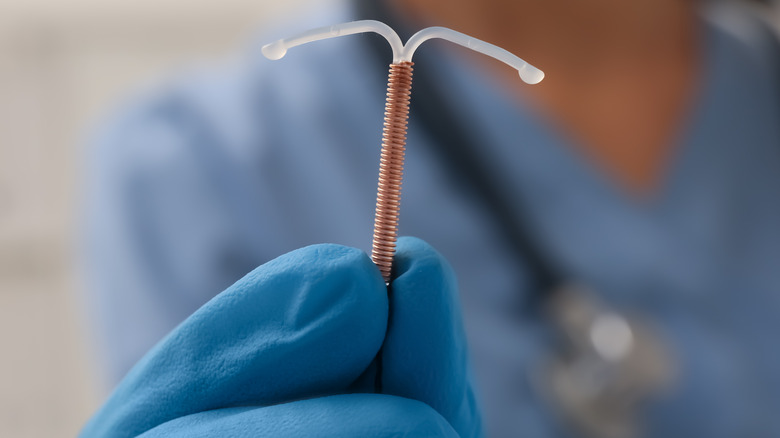Your Options For Emergency Contraception Beyond The Morning-After Pill
When it comes to emergency contraception (EC), the first option that comes to mind is Plan B (levonorgestrel), also known as the "morning-after pill." Plan B can be taken up to five days after unprotected intercourse, according to Planned Parenthood, but its effectiveness decreases with each passing day. Plan B is most effective within the first three days after birth-control failure, decreasing your chances of conception by 75% to 89%; that's why it's always a good idea to take it as soon as you can.
But while Plan B is a great resource for those wanting to prevent pregnancy, it's not without its flaws. For example, people who weigh more than 165 pounds or have a BMI higher than 30, may not be able to delay ovulation — which is what the morning-after pill is supposed to do — in order to prevent conception with Plan B. It's important to highlight that BMI ratings have been called into question, and those guidelines aren't necessarily as rigid as people may have long thought them to be. However, considering effectiveness is the desired goal, the best course of action is to consult a doctor
As of writing this, 12 U.S. states have banned abortion with other states in the process of trying to join those states in total bans, and even more looking to ban abortion after six weeks. With these laws being put in motion and other restrictions just waiting in the wings to be signed off on, knowing all your emergency contraception options is paramount. No person should be forced to carry a fetus to term that they don't want. It doesn't matter if you skipped the condom in the heat of the moment, it broke during some rough and tumble intercourse — whatever the case may be — if you want to avoid the possibility of becoming pregnant, then here are other EC options available to you.
IUD
According to the World Health Organization, a copper-bearing IUD is the most effective form of emergency contraception. This mode of EC works because the copper creates a chemical change in both the sperm and egg, thereby preventing pregnancy from occurring. The IUD can be inserted within five days (120 hours) of unprotected intercourse and is 99% effective, no matter your weight or BMI. In addition to its high rate of effectiveness, once the IUD is inserted, it can remain there and be used as an ongoing form of birth control. If you'd prefer another method of birth control, once confirmed that the IUD prevented any possible pregnancy, it can be removed and you can shift to your contraception of choice.
However, when choosing the IUD for EC, the kicker is that whether you have it inserted for a few weeks or for 10 to 12 years (the duration for which it can stay inside as a long-term birth control method), the cost is still the same. Although some insurance plans cover IUDs, those who have to pay out of pocket can pay as much as $1,300; this makes this method of emergency contraception the most expensive if you pay the full amount and then have it removed. If your insurance allows for IUD coverage, covering most or all of the cost, it's worth noting that during and after the procedure, there can be side effects like pain and cramping during the insertion, as well as spotting in the days and weeks that follow.
Ulipristal acetate
Also known as Ella, ulipristal acetate is more effective than levonorgestrel (Plan B) and, according to the American Congress of Obstetricians and Gynecologists, its effectiveness can last up to five days after unprotected sex. However, that doesn't mean you should wait until the fourth or fifth day to take Ella. When it comes to any type of EC, it's best to take it as soon as possible.
A 2016 study published in the Australian Prescriber found that the efficacy of ulipristal, compared to levonorgestrel, is superior. When ulipristal is taken within zero to 24 hours after unprotected sex, the pregnancy rate among participants in the study was 0.9%, whereas with levonorgestrel, it was 2.5%. When taken within zero to 120 hours afterward, ulipristal's pregnancy rate was 1.3%, and 2.2% for levonorgestrel. But while the efficacy of preventing pregnancy for a longer period of time after unprotected sex is undoubtedly in favor of Ella, there has been some research suggesting that obesity may play a role in its effectiveness.
Although both Plan B and Ella cost about the same — between $40 and $50 — Plan B is accessible over the counter without a prescription. Ella, on the other hand, would require a trip to your healthcare provider to get a prescription before being able to obtain it from the pharmacy. Coverage for either option is dependent upon your insurance plan.
Combined oral contraceptives (COC)
If you've ever wondered if you could use your birth control pills as a form of EC, the answer is yes — it's called the Yuzpe regimen. As is the case with the other methods of EC, you want to take COCs within five days of having unprotected sex and, like the other methods, sooner is always better.
If you choose to use birth control pills for emergency contraception, it involves taking more than one pill at a time, then taking another dose 12 hours later. According to the American Family Physician, how many pills you take is dependent upon the levels of estrogen and progestin hormones that are in your birth control pills. For example, if you've been prescribed Ovrette, you'll initially need to take 20 pills, then 20 more pills 12 hours later, but if you're on Lo/Ovral, you'll need to take four pills for your first dose, then four pills for the second dose. According to the Center for Disease Control, the side effects of this option have higher rates of nausea and vomiting, than if Plan B or Ella was taken. Research has also found that high doses of hormonal birth control pills might increase blood pressure, making it a less-ideal choice for people with high blood pressure or those who are unaware of their blood pressure status.
Although it's great that Plan B isn't the only form of EC out there, before choosing the method that's best for you, talk to your healthcare provider. Bodily autonomy is a wonderful thing, but having that control in a safe way is just as important.



